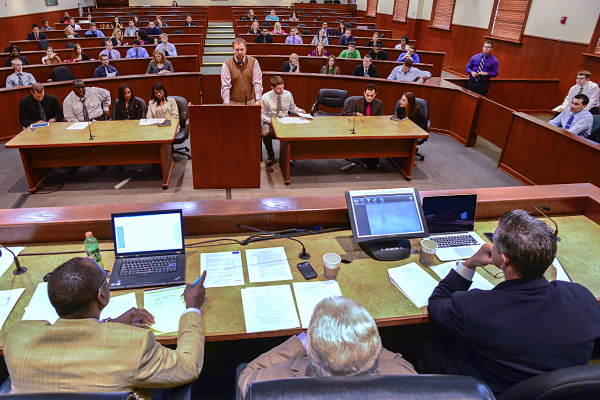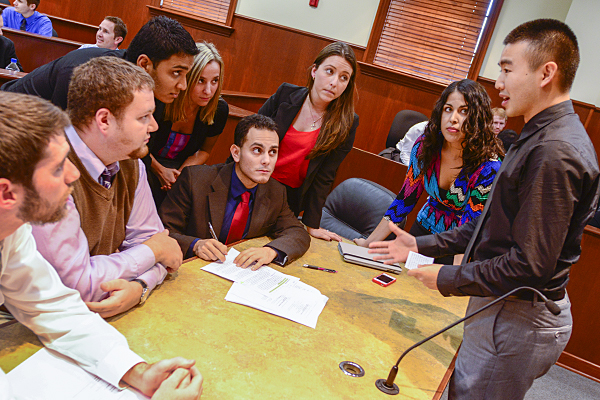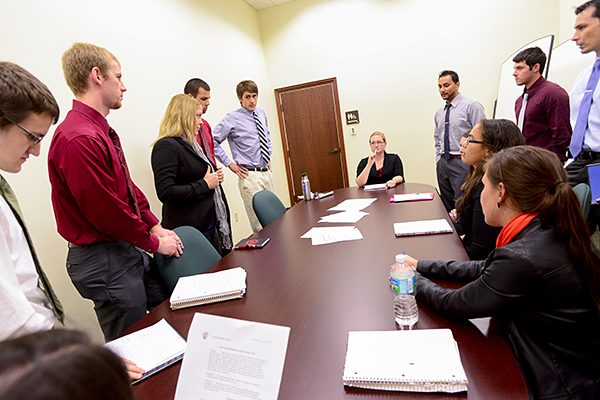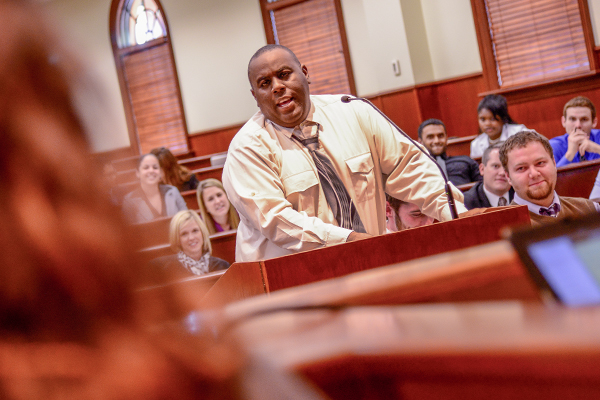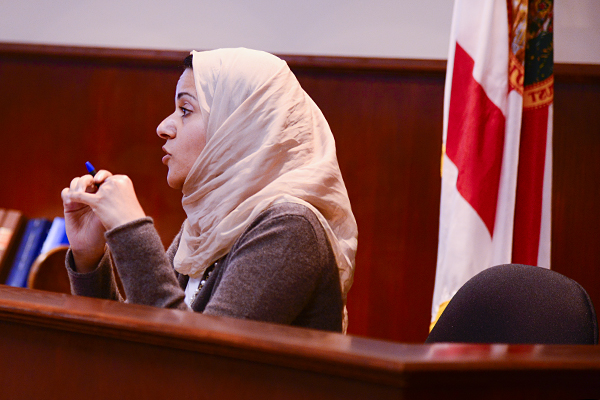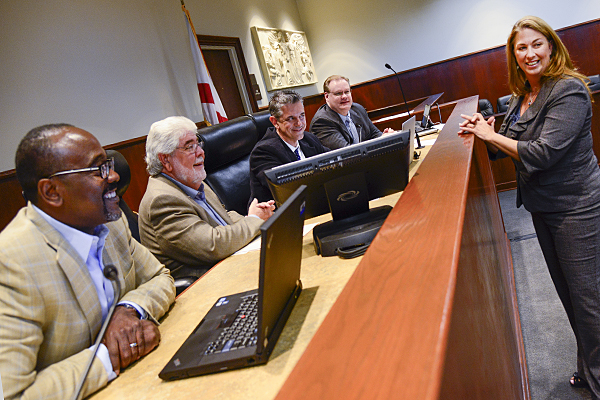From its inception, the USF College of Pharmacy set out to be a pacesetter for teaching future pharmacists.
A perfect example of just how innovative the young program is took place recently when first-year students gathered at the Stetson Law Center in downtown Tampa to participate in a mock trial, a creative, interactive and effective learning exercise that gave students a hands-on look at how their future careers could play out and drive home the idea of professional responsibility.
“No one else is doing this,” said Bob Parrado, BPharm, RPh, former chair of the Florida Board of Pharmacy, past president of the Florida Pharmacy Association, and a volunteer who acted as one of the “judges” at the mock trial.
“An exercise like this gives these students a head start for what it means to be a professional and gets them thinking now, in their first year, on a professional level, about their responsibilities.”
****
The courtroom got quiet as the trial was called into session. Teams of lawyers filled the seats at both the prosecution and defense tables. Jurors took their places in the jury box. And a panel of four judges presided at the front of the courtroom.
The setting seemed so real, yet on the docket for this day was a mock trial, a practice court of sorts that allows students to experience a trial as part of a learning exercise. While the “trial” exposes students to some of the nuances of strategy and rule of law, this day focused mostly on working together as a team, critical thinking, public speaking, an introduction to pharmacy law and ethics, understanding medication errors and proper documentation, and the importance of inter-professionalism as an integral member of the healthcare team.
Typically an exercise for law school students, this particular mock trial had a cast of first-year pharmacy students.
“We want our students to learn early the impact medical errors could have on lives, as well as on their own careers,” said Heather Petrelli, assistant dean for Student Affairs and Assessment for the USF College of Pharmacy and coordinator for the mock trials.
“A mock trial bridges the concepts we are teaching in the classroom about professionalism, ethics and communications. The aim is to get them to start thinking now about better communication, better checks and balances, and improved systems.”
Strategizing their closing arguments are the defense (top photo) and the prosecution (bottom photo).
And the effort seems to work.
“This experience not only taught us how to work in groups but also the consequences of possible future actions,” said first-year student Alex Hatzileris, who worked on the defense in the case of the pharmacist accused of mislabeling a medication that lead to the death of a child.
“I have worked in a pharmacy before as a technician, and while we try our best to avoid medication errors, they do happen. It is a scary thing. You never think it could happen to you, but after working on this case, we learned caution needs to be practiced on a larger scale to prevent these errors from happening. I have realized how important it is to have open communication with your co-workers and fellow professionals in the field to ensure everyone understands a conversation in the same way.”
“The mock trial was a self-learning opportunity that let us experience firsthand the importance of our professional decision making,” said Jenna Wood, now a second-year pharmacy student who participated in last year’s inaugural mock trial.
“I was a defense lawyer last year, and although it was a lot of pressure presenting our argument to such a recognized panel of judges, it really allowed me to get out of my ‘pharmacy student’ comfort zone. The mock trial really aided my critical thinking abilities by being bombarded with packets upon packets of reading materials, taking it all in, throwing around ideas with your group members, and really being able to get creative and turning that material into a solid case that either defends or proves negligence on a pharmacist.”
Held in a Tampa Stetson Law Center courtroom, this year’s mock trials included two cases against pharmacists: one involved the death of a young child given three times the prescribed dose of a medication while in the hospital, and the other was for trafficking large quantities oxycodone.
Then, the jury deliberates and votes their verdict.
Similar to the structure of an actual trial – students read opening arguments, presented evidence, questioned witnesses, read closing arguments, and provided statements to the jury – this mock trial was a blend of a pharmacy board hearing and a civil case in structure. Every student was required to speak, Petrelli said, and took on roles that included lawyer, witness, impacted party, defendant, juror, and focus group member, which provided peer feedback.
Among other criteria, students were graded on preparedness, verbal communication, submission of the case, and argument. There were also strong self- and peer-evaluation components.
****
The result was a fun and creative student-centered exercise that mirrored real-world cases and offered a glimpse of what many pharmacists are likely to face in their profession, Petrelli said.
“Every one of these students thinks he or she won’t be the one to make these kinds of mistakes,” she said. “But medical errors are a reality and exposure to litigation and practicing, even this small amount, will go a long way for them.”
From left are ‘judges’ Damian Fletcher, Bob Parrado, Dr. Jeff Vaughan, and Dr. Dan Buffington, with Heather Petrelli.
The “judges” were volunteers and long-time supporters and advisors for the College: Dan Buffington, PharmD, a courtesy faculty member and a chair of the College’s Board of Advisors; Damian Fletcher, JD, an attorney who has represented pharmacists and who teaches pharmacy law for the USF College of Pharmacy; Bob Parrado, BPharm, RPh, former chair of the Florida Board of Pharmacy and past president of the Florida Pharmacy Association; and Jeff Vaughan, PharmD, director of clinical services for Clinical Pharmacology Services. Also providing feedback was Jeff Mesaros, JD, PharmD, a healthcare attorney and pharmacist and a current member of the Board of Pharmacy, and Brian Guthrie PharmD, JD, also a healthcare attorney. Sarah Steinhardt, PharmD, JD, and Jennifer Pytlarz, PharmD, are USF faculty who assisted with coordinating the activity and worked with the judges panel to develop the case.
These judges agreed that USF’s pharmacy program was leading the way for other programs when it comes to fully preparing student for careers as pharmacists. While some programs have faculty, and even staff, act out the roles while the pharmacy students merely observe, USF’s Pharmacy program opts to have the students take on the roles.
“It’s not happening anywhere else in Florida,” Fletcher said. “The mock trial is important because it gets students to think about it now, from this point forward, and not after they’ve been sued, which is how it usually goes. It gets them thinking about why they’re doing what they’re doing, not just moving along doing it.”
“As a future pharmacist, a student needs to understand the laws early and what his or her responsibilities are as part of a whole healthcare system, with policies and procedures that should be reviewed regularly,” Dr. Vaughan said. “This is a great exercise and is the first one I’ve heard of that has first-year students working as a group.”
In congratulating the students on their work in the mock trial, Dr. Buffington also helped them see a bottom line, of sorts.
“Don’t let emotions run you; there are standards of care you must follow,” he said. “You are the drug information expert, period.”
– Photos by Eric Younghans, USF Health Communications
